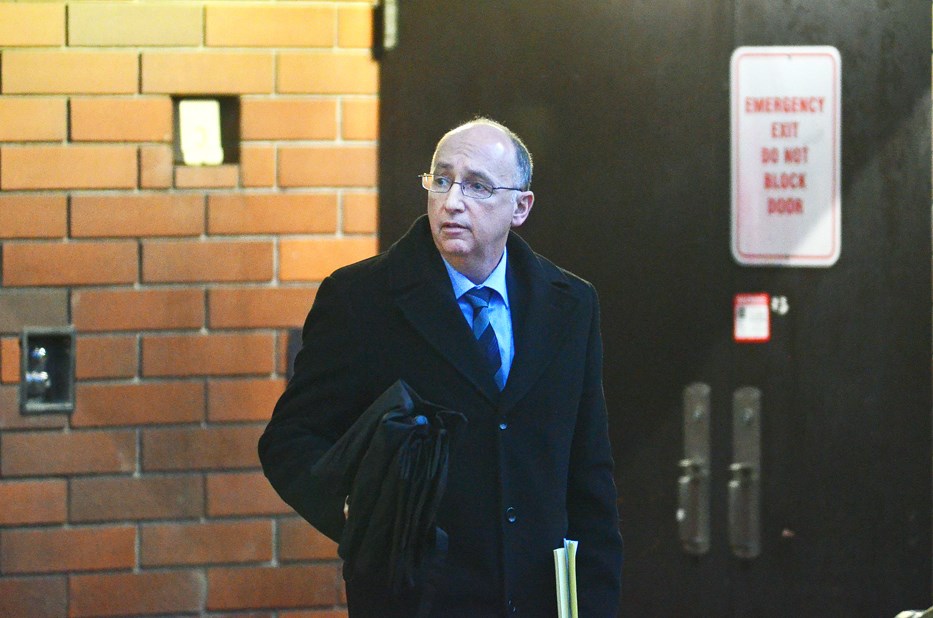“This is a very tricky game.”
Such were the words of Burnaby’s Brian Bonney in an email to a woman hired to woo ethnic voters in swing ridings and tip the scales in favour of the B.C. Liberal Party ahead of the 2013 provincial election.
Bonney, a former government communications director and former director of the B.C. Liberal Party, pleaded guilty in October to breach of trust for using government resources for partisan purposes in relation to the Liberals’ so-called “quick wins” plan.
He was in B.C. Provincial court this week for sentencing.
During a three-day hearing that started in Vancouver Tuesday, special prosecutor David Butcher argued Bonney’s “tricky game” quote, along with statements in numerous other emails calling for secrecy, showed Bonney knew “all was not right,” with his activities as he carried out parts of the Liberals’ Multicultural Strategic Outreach Plan, drafted after a meeting on Dec. 1, 2011 that included representatives from the premier’s office, the Liberal caucus and the Liberal party.
The special prosecutor presented numerous emails between Bonney and three publicly paid outreach workers whom he directed in “highly and increasingly partisan activity” leading up to the 2013 election, according to Butcher.
Targeting key ethnic groups in swing ridings, including Burnaby ridings, the emails show Bonney instructing the outreach workers to organize meetings with “visible minority” groups whose leaders might be supportive of, or potential donors for, the Liberal party, to assemble lists of multicultural groups and identify whether their leaders supported or donated to the Liberal party, to recruit Liberal supporters to sit on boards and to help Liberal supporters receive community grants. The emails also show Bonney directing the outreach workers to write partisan op ed pieces and to phone into radio phone-in programs.
Some of the emails supplied confidential information about MLAs and cabinet minister’s weekly activities for the outreach workers to use.
He called the information “highly classified” and said he could lose his job if it got out.
While Butcher characterized the Liberal plan and Bonney’s efforts to woo ethnic voters in swing ridings as “cynical and political” and not a legitimate attempt at multicultural engagement, he said it would not have been criminal if Bonney had not been a government employee.
“Had this been a purely party activity, there wouldn’t have been a criminal prosecution,” Butcher said.
As it was, Bonney’s direction of the outreach workers during work hours and his passing on of government information was “completely inappropriate,” according to Butcher.
Butcher called for a conditional sentence in the range of 12 to 23 months to be served in the community, including four to six months of house arrest.
Butcher further asked for Bonney to be ordered to complete a “substantial amount” of community work service and that he be banned from volunteering or fundraising with any political party during his sentence.
“The court should send a strong and clear message to those involved in politics that breach of trust will be treated in a serious manner,” Butcher said.
Defence lawyer Ian Donaldson, meanwhile, said his client was “barely guilty” and asked Provincial Court Justice David St. Pierre to consider a discharge or, failing that, a conditional sentence in the range of 30 to 90 days.
Donaldson argued it was Bonney’s position as the communications director of the multiculturalism branch that was tricky and that his wrong actions need to be taken in context.
As the only communications director of a branch instead of a ministry, Donaldson argued, Bonney took direction from a number of “bosses” – including staff in the premier’s office, two cabinet ministers and people in the Liberal party caucus – and that they failed to make clear to Bonney the line between government, caucus and Liberal party work that were appropriate for him to engage in.
“All of these different people occupying senior positions in different roles in the government, I say were aware of his activities and indeed encouraged and gave him positive feedback about many of those activities,” Donaldson said.
He clarified, however, that Bonney accepted responsibility and wasn’t attempting to shift criminal blame onto his superiors.
“Clearly these people didn’t think, in my submission there’s no reason to think, that they believed they were directing Mr. Bonney to break the law,” he said.
Donaldson further argued Bonney did “everything and more” in fulfilling his government duties, and that his partisan activities had been in addition to that work and not taken away from it.
This despite a review by then-Premier Christy Clark’s deputy minister John Dyble concluded in 2013 that Bonney had spent about half his time as a government communications director engaged in partisan work, and the Liberal party paid $70,000 to reimburse the government.
In arguing for a discharge or shorter conditional sentence, Donaldson said future government employees will be adequately deterred by the “incineration” of Bonney’s reputation in the community over the last few years and that a longer sentence would add little to deter them further.
Bonney’s sentencing hearing continued Friday afternoon after the NOW’s press deadline.
A decision by St. Pierre is expected in the coming weeks.



